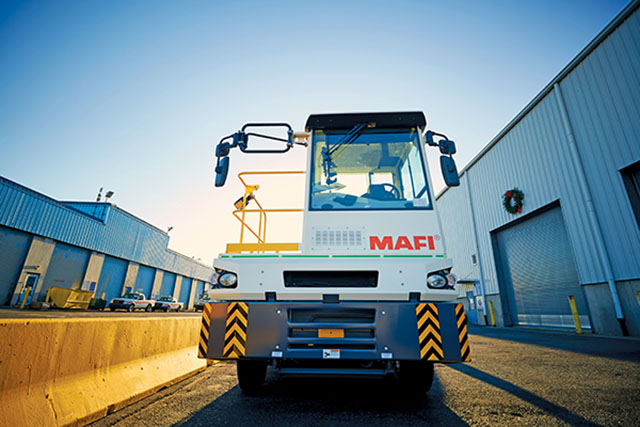
New data released from the Propane Education & Research Council (PERC) and Port Newark Container Terminal (PNCT) shows propane-powered terminal tractors are significantly cleaner than their diesel counterparts in several key emissions reduction areas.
In recent testing at PNCT, researchers collected emissions data from a MAFI-manufactured propane terminal tractor and Tier 4 diesel technologies. The results confirm the propane-powered tractor yielded 99% fewer nitrogen oxide (NOx) composite and idle emissions than either diesel tractor. Additionally, the propane tractor produced 77.5% fewer THC idle emissions, 14% fewer brake-specific carbon dioxide emissions, and 75% fewer TPM emissions than the diesel tractors.
MAFI’s propane tractor is powered by Power Solutions International’s (PSI) 8.8-liter propane engine, which is over 90% cleaner than mandated U.S. Environmental Protection Agency (EPA) standards and certified to the optional ultra-low NOx emissions standard as defined by the California Air Resources Board (CARB) for heavy-duty engines with .02 grams of per brake horsepower. Plus, the propane engine competes with diesel engines on performance, providing 270 horsepower with 565 pounds per foot of torque.
“This near-zero emissions technology terminal tractor is available now for an affordable price,” said Gavin Hale, vice president of business development at the Propane Education & Research Council (PERC). “Propane technology adoptions are continuing to grow at ports, terminals and warehouses throughout the country to eliminate diesel emissions and make significant strides toward greenhouse gas reduction.”
Not only are propane-powered terminal tractors cost effective, there is also grant money available through the Diesel Emissions Reduction Act (DERA) to support the transition to clean propane-powered fleet technology. This includes terminal tractors, propane autogas fleet vehicles and energy production technology.
To learn more about propane-powered terminal tractors, visit Propane.com/Ports.

